Men carrying far-right Svoboda flags wait in front of the Ukrainian Parliament in Kiev on February 27.
- Russian President Putin says violent far-right groups are behind coup d'etat in Kiev
- David Speedie: Far-right activity might be exaggerated, but EU has condemned them
- Speedie: The far-right party Svoboda holds key posts in the new Ukrainian government
- He says the far right must be marginalized to attain a democratic, peaceful Ukraine
Editor's note: David C. Speedie is senior fellow director for the U.S. Global Engagement Program at the Carnegie Council for Ethics in International Affairs, an educational, nonprofit, nonpartisan organization that produces lectures, publications and multimedia materials on the ethical challenges of living in a globalized world.
(CNN) -- Russian President Vladimir Putin says neo-fascist far-right groups are firmly behind the putsch -- coup d'etat -- in Kiev and questions the democratic credentials of "men with black masks and Kalashnikovs" who became the poster children of the Maidan for Russians.
Does this assessment have any truth to it? In the fast-moving and chronically complex course of events in Ukraine, the issue has been debated from the beginning: the role of the far right in the events that led to the toppling of the Viktor Yanukovych government and in the present and future disposition of political power in the country.
There are some known facts: First, far-right, anti-Semitic, anti-Russian and openly fascist groups have existed and do exist as a blight on modern Ukraine. A 2012 European Parliament resolution condemned the main -- but by no means most extreme -- ultra-right party, Svoboda, as "racist, anti-Semitic and xenophobic."
This extraordinary EU resolution contains 18 points of concern over policies embedded in laws of the Ukrainian Rada, or Parliament. A key paragraph reads that the EU "is concerned about the rising nationalistic sentiment in Ukraine." The Parliament stresses that "racist, anti-Semitic and xenophobic views go against the EU's fundamental values and principles."
The resolution also appeals to pro-democratic parties in the Rada "not to associate with, endorse or form coalitions with this party."
As if to endorse the sentiments of the EU resolution, the leader of Svoboda (or "Freedom"), Oleh Tyahnybok, is on record saying that Kiev is governed by "a Jewish-Russian mafia" and has said Ukrainians bravely fought Muscovites, Germans, Jews "and other scum" in World War II.
This unsavory constituency, including the "ultra" Right Sector movement, manned the barricades in the Kiev uprising, providing "security" to the mainstream political opposition leaders and matching the pro-government forces in violent tactics that led to the dozens of dead in and around the Maidan.
These rightist-nationalist forces were in large part responsible for the collapse of the agreement signed in February that called for early parliamentary and presidential elections and a return to the 2004 Ukrainian constitution, which harks back to the "Orange Revolution" that brought a pro-West government to power in Ukraine.

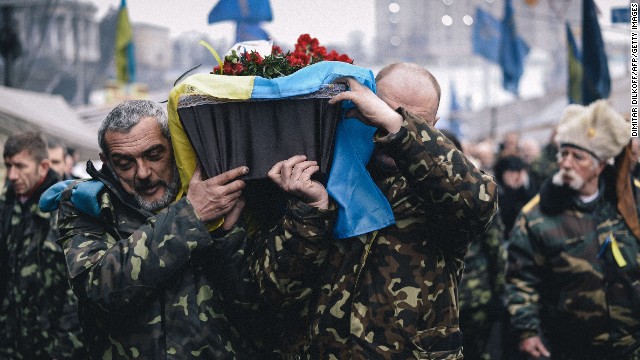 The coffin of a man killed near Maidan Square is carried through central Kiev on Thursday, March 6. Ukrainian officials and Western diplomats accuse Russia of sending thousands of troops into the Crimea region in the past week, a claim Russia has denied. The crisis in the former Soviet republic has revived concerns of a return to Cold War relationships. Follow the evolving story on CNN's live blog.
The coffin of a man killed near Maidan Square is carried through central Kiev on Thursday, March 6. Ukrainian officials and Western diplomats accuse Russia of sending thousands of troops into the Crimea region in the past week, a claim Russia has denied. The crisis in the former Soviet republic has revived concerns of a return to Cold War relationships. Follow the evolving story on CNN's live blog.  Servicemen guard a checkpoint at a Ukrainian Navy base in Perevalnoe, Crimea, on March 6.
Servicemen guard a checkpoint at a Ukrainian Navy base in Perevalnoe, Crimea, on March 6.  Ukrainian troops guard the Belbek air base outside Sevastopol, Ukraine, on March 6.
Ukrainian troops guard the Belbek air base outside Sevastopol, Ukraine, on March 6.  A woman walks past barricades on March 6 that were set up by anti-government protesters in Kiev's Independence Square.
A woman walks past barricades on March 6 that were set up by anti-government protesters in Kiev's Independence Square.  A sailor guards the Ukrainian Navy ship Slavutych in the Bay of Sevastopol on Wednesday, March 5.
A sailor guards the Ukrainian Navy ship Slavutych in the Bay of Sevastopol on Wednesday, March 5. 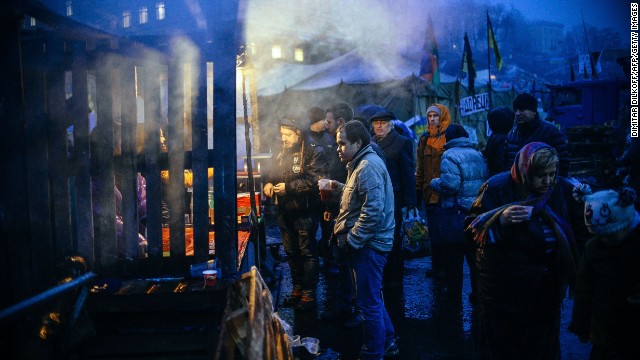 People wait in line for food distribution in Independence Square on March 5.
People wait in line for food distribution in Independence Square on March 5. 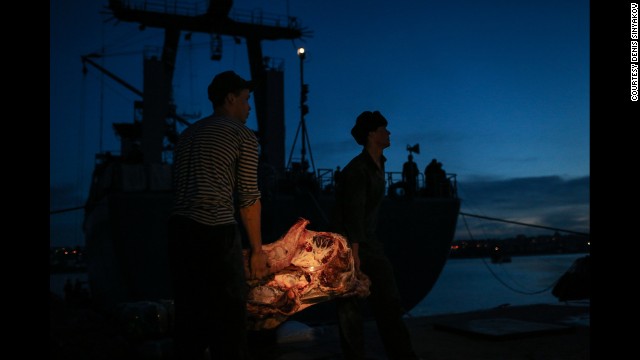 Ukrainian sailors carry meat to their vessel in the Sevastopol harbor on March 5.
Ukrainian sailors carry meat to their vessel in the Sevastopol harbor on March 5.  Riot police stand at the entrance of a regional administrative building during a rally in Donetsk, Ukraine, on March 5.
Riot police stand at the entrance of a regional administrative building during a rally in Donetsk, Ukraine, on March 5.  A Ukrainian police officer gives instructions to members of the media in front of the business class lounge of the Simferopol airport on March 5.
A Ukrainian police officer gives instructions to members of the media in front of the business class lounge of the Simferopol airport on March 5.  Pro-Russia demonstrators wave a Russian flag after storming a regional administrative building in Donetsk on March 5.
Pro-Russia demonstrators wave a Russian flag after storming a regional administrative building in Donetsk on March 5.  Demonstrators break a police barrier as they storm a regional administrative building in Donetsk on March 5.
Demonstrators break a police barrier as they storm a regional administrative building in Donetsk on March 5.  Ukrainian military recruits line up to receive instructions in Kiev's Independence Square on Tuesday, March 4.
Ukrainian military recruits line up to receive instructions in Kiev's Independence Square on Tuesday, March 4.  People stand on the Ukrainian Navy ship Slavutich while it's at harbor in Sevastopol on March 4. Mattresses were placed over the side of the ship to hinder any attempted assault.
People stand on the Ukrainian Navy ship Slavutich while it's at harbor in Sevastopol on March 4. Mattresses were placed over the side of the ship to hinder any attempted assault.  Ukrainian troops watch as a Russian navy ship blocks the entrance of the Ukrainian navy base in Sevastopol on March 4.
Ukrainian troops watch as a Russian navy ship blocks the entrance of the Ukrainian navy base in Sevastopol on March 4.  A woman photographs pro-Russian soldiers guarding Ukraine's infantry base in Perevalnoye, Ukraine, on March 4.
A woman photographs pro-Russian soldiers guarding Ukraine's infantry base in Perevalnoye, Ukraine, on March 4.  U.S. Secretary of State John Kerry, wearing a blue scarf, visits a shrine March 4 for the people who were killed during anti-government protests in Kiev last month.
U.S. Secretary of State John Kerry, wearing a blue scarf, visits a shrine March 4 for the people who were killed during anti-government protests in Kiev last month.  Yuli Mamchun, the commander of the Ukrainian military garrison at the Belbek air base near Sevastopol, salutes on March 4.
Yuli Mamchun, the commander of the Ukrainian military garrison at the Belbek air base near Sevastopol, salutes on March 4.  Russian soldiers stand guard at the Belbek air base on March 4.
Russian soldiers stand guard at the Belbek air base on March 4.  Ukrainian military members march at the Belbek air base on March 4.
Ukrainian military members march at the Belbek air base on March 4.  Russian soldiers fire warning shots to keep back Ukrainian military members at the Belbek air base on March 4.
Russian soldiers fire warning shots to keep back Ukrainian military members at the Belbek air base on March 4.  A Ukrainian airman puts the Ukrainian national flag over the gate of the Belbek air base as they guard what's left under their control on March 4.
A Ukrainian airman puts the Ukrainian national flag over the gate of the Belbek air base as they guard what's left under their control on March 4.  Russian soldiers aim a grenade launcher and machine gun as they guard positions at the Belbek air base on March 4.
Russian soldiers aim a grenade launcher and machine gun as they guard positions at the Belbek air base on March 4.  Ukrainian seamen stand guard on the Ukrainian navy ship Slavutich in the Sevastopol harbor on Monday, March 3.
Ukrainian seamen stand guard on the Ukrainian navy ship Slavutich in the Sevastopol harbor on Monday, March 3.  Oleg, a Ukrainian soldier, kisses his girlfriend, Svetlana, through the gates of the Belbek base entrance on March 3. Tensions are high at the base, where Ukrainian soldiers were standing guard inside the building while alleged Russian gunmen were standing guard outside the gates.
Oleg, a Ukrainian soldier, kisses his girlfriend, Svetlana, through the gates of the Belbek base entrance on March 3. Tensions are high at the base, where Ukrainian soldiers were standing guard inside the building while alleged Russian gunmen were standing guard outside the gates.  Wives of Ukrainian soldiers walk past Russian soldiers to visit their husbands guarding a military base in Perevalnoye on March 3.
Wives of Ukrainian soldiers walk past Russian soldiers to visit their husbands guarding a military base in Perevalnoye on March 3.  A Russian soldier guards an area outside Ukraine's military base in the village of Perevalnoye on March 3.
A Russian soldier guards an area outside Ukraine's military base in the village of Perevalnoye on March 3.  A sailor looks out a window near the entrance to the Ukrainian navy headquarters in Sevastopol on March 3.
A sailor looks out a window near the entrance to the Ukrainian navy headquarters in Sevastopol on March 3.  Armed men in military uniform walk outside a Ukrainian military unit near Simferopol on Sunday, March 2. Hundreds of armed men in trucks and armored vehicles surrounded the Ukrainian base Sunday in Crimea, blocking its soldiers from leaving.
Armed men in military uniform walk outside a Ukrainian military unit near Simferopol on Sunday, March 2. Hundreds of armed men in trucks and armored vehicles surrounded the Ukrainian base Sunday in Crimea, blocking its soldiers from leaving.  Soldiers walk outside a Ukrainian military base in Perevalne, Ukraine, as a local resident waves a Russian flag March 2.
Soldiers walk outside a Ukrainian military base in Perevalne, Ukraine, as a local resident waves a Russian flag March 2.  Demonstrators shout during a rally in Kiev's Independence Square on March 2.
Demonstrators shout during a rally in Kiev's Independence Square on March 2.  Ukrainian soldiers, left, and unidentified gunmen, right, stand at the gate of an infantry base in Perevalnoye on March 2.
Ukrainian soldiers, left, and unidentified gunmen, right, stand at the gate of an infantry base in Perevalnoye on March 2.  Ukrainian soldiers guard a gate of an infantry base in Perevalnoye on March 2.
Ukrainian soldiers guard a gate of an infantry base in Perevalnoye on March 2.  A woman cries during a rally in Independence Square on March 2.
A woman cries during a rally in Independence Square on March 2.  Protesters hold flags of the United States, Germany and Italy during a rally in Independence Square on March 2.
Protesters hold flags of the United States, Germany and Italy during a rally in Independence Square on March 2.  People attend a morning prayer service at Independence Square on March 2.
People attend a morning prayer service at Independence Square on March 2.  A soldier and a truck driver unload bread outside the Ukranian navy headquarters in Sevastopol, Ukraine, on March 2.
A soldier and a truck driver unload bread outside the Ukranian navy headquarters in Sevastopol, Ukraine, on March 2.  Heavily armed troops, displaying no identifying insignia and who were mingling with local pro-Russian militants, stand guard outside a local government building in Simferopol, Ukraine, on March 2.
Heavily armed troops, displaying no identifying insignia and who were mingling with local pro-Russian militants, stand guard outside a local government building in Simferopol, Ukraine, on March 2. 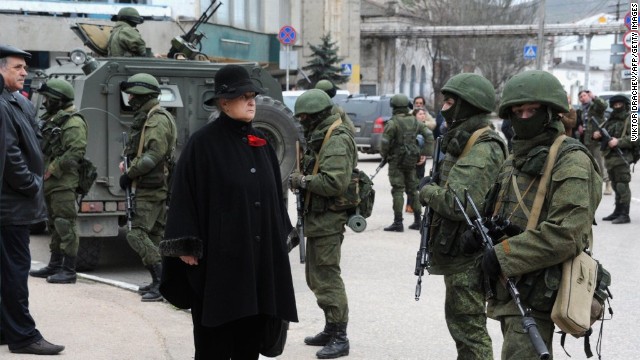 A woman waits in front of unidentified men in military fatigues who were blocking a base of the Ukrainian frontier guard unit in Balaklava, Ukraine, on Saturday, March 1.
A woman waits in front of unidentified men in military fatigues who were blocking a base of the Ukrainian frontier guard unit in Balaklava, Ukraine, on Saturday, March 1. 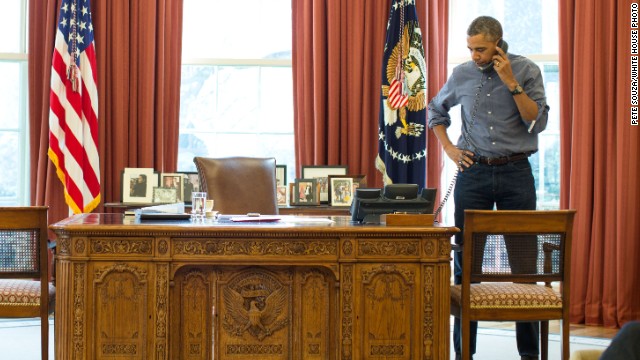 U.S. President Barack Obama, in the Oval Office of the White House, talks on the phone March 1 with Russian President Vladimir Putin.
U.S. President Barack Obama, in the Oval Office of the White House, talks on the phone March 1 with Russian President Vladimir Putin. 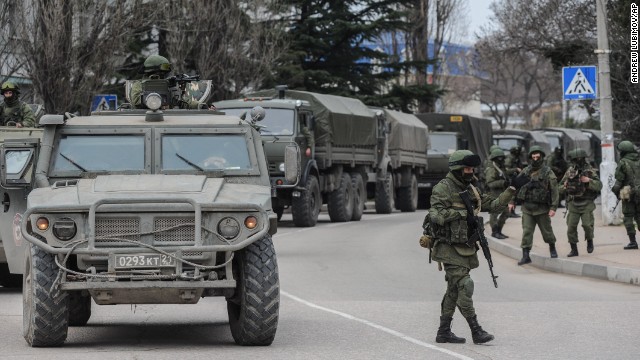 Troops stand guard in Balaklava on March 1.
Troops stand guard in Balaklava on March 1. 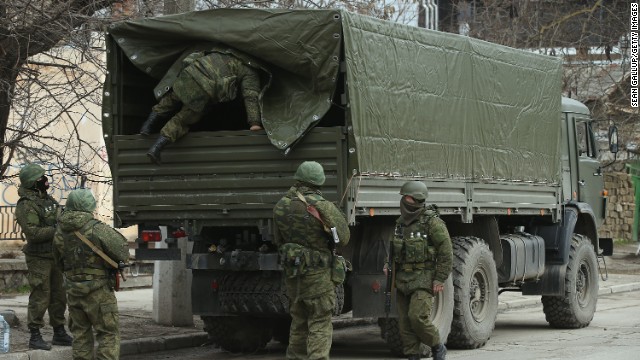 Heavily armed soldiers displaying no identifying insignia maintain watch in Simferopol, Ukraine, on March 1.
Heavily armed soldiers displaying no identifying insignia maintain watch in Simferopol, Ukraine, on March 1. 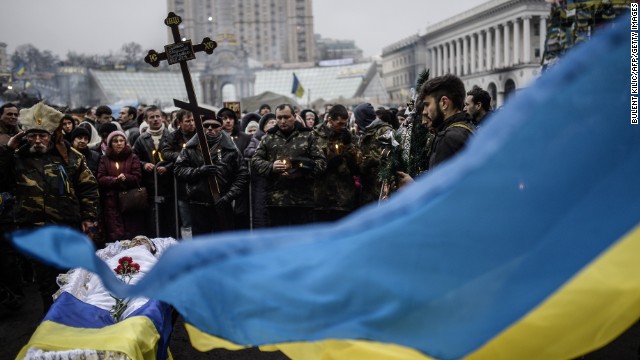 People gather around the coffin of a man who was killed during clashes with riot police in Independence Square.
People gather around the coffin of a man who was killed during clashes with riot police in Independence Square.  Pro-Russian activists hold Russian flags during a rally in the center of Donetsk, Ukraine, on March 1.
Pro-Russian activists hold Russian flags during a rally in the center of Donetsk, Ukraine, on March 1. 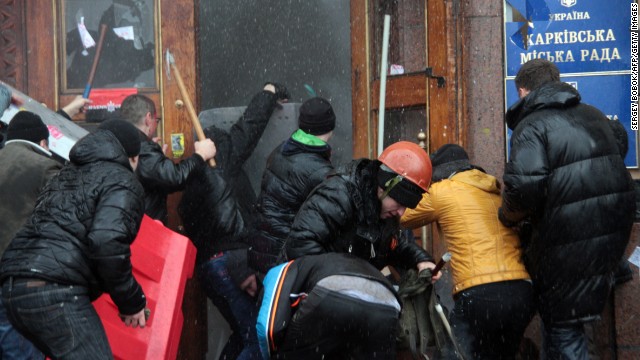 Pro-Russian activists clash with Maidan supporters as they storm the regional government building in Kharkiv, Ukraine, on March 1.
Pro-Russian activists clash with Maidan supporters as they storm the regional government building in Kharkiv, Ukraine, on March 1. 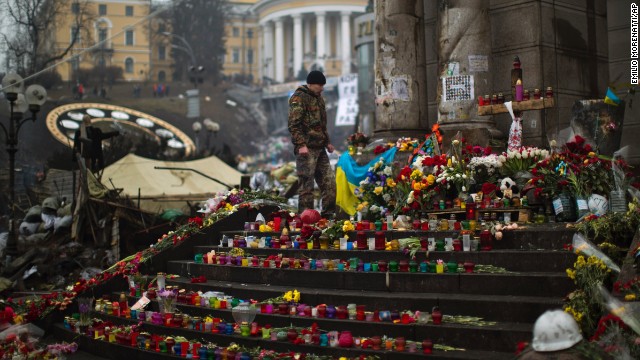 A protester stands at a memorial March 1 for the people killed in clashes at Independence Square.
A protester stands at a memorial March 1 for the people killed in clashes at Independence Square. 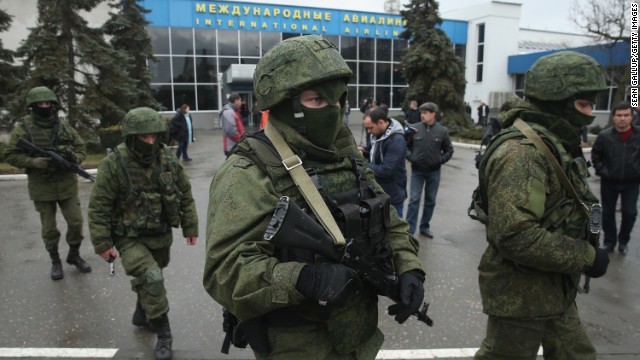 Armed men patrol outside the Simferopol International Airport in Ukraine's Crimea region on Friday, February 28. Simferopol is the regional capital.
Armed men patrol outside the Simferopol International Airport in Ukraine's Crimea region on Friday, February 28. Simferopol is the regional capital. 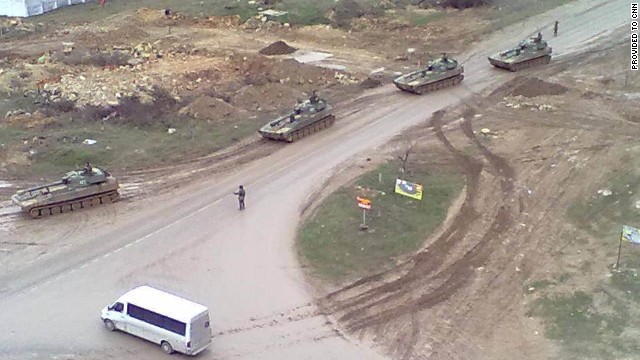 An image provided to CNN by a local resident shows Russian tanks on the move in Sevastopol, Ukraine.
An image provided to CNN by a local resident shows Russian tanks on the move in Sevastopol, Ukraine. 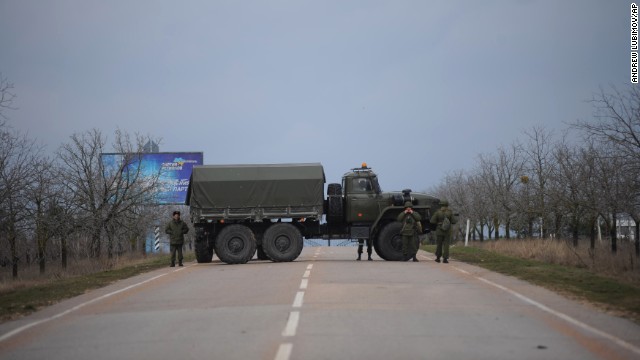 Russian troops block a road February 28 toward the military airport in Sevastopol, Ukraine. The Russian Black Sea Fleet is based at the port city of Sevastopol.
Russian troops block a road February 28 toward the military airport in Sevastopol, Ukraine. The Russian Black Sea Fleet is based at the port city of Sevastopol. 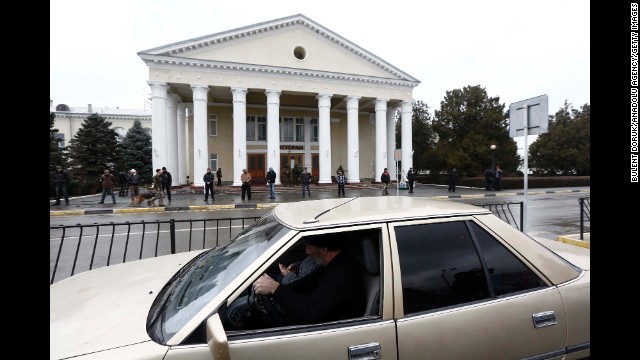 Armed men stand guard in front of a building near the Simferopol airport on February 28.
Armed men stand guard in front of a building near the Simferopol airport on February 28. 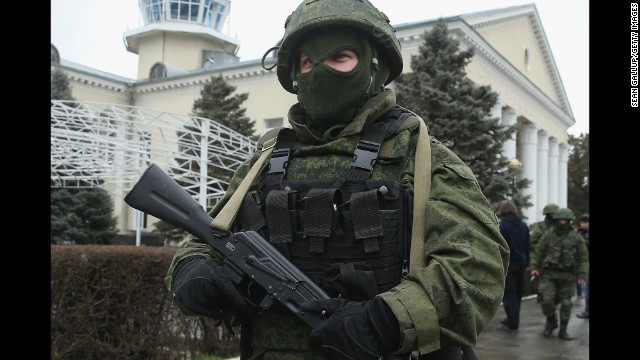 An armed man wearing no identifying insignia patrols outside Simferopol International Airport on February 28.
An armed man wearing no identifying insignia patrols outside Simferopol International Airport on February 28. 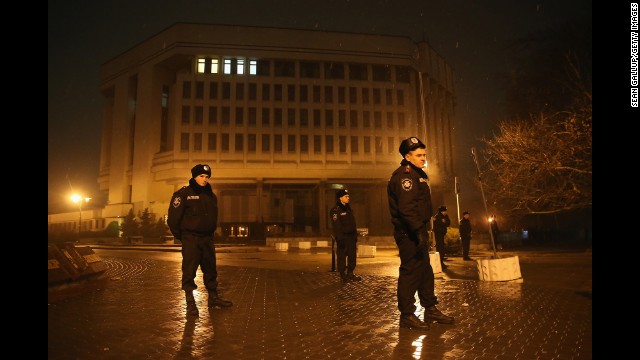 Police stand guard outside the Crimea regional parliament building Thursday, February 27, in Simferopol. Armed men seized the regional government administration building and parliament in Crimea.
Police stand guard outside the Crimea regional parliament building Thursday, February 27, in Simferopol. Armed men seized the regional government administration building and parliament in Crimea. 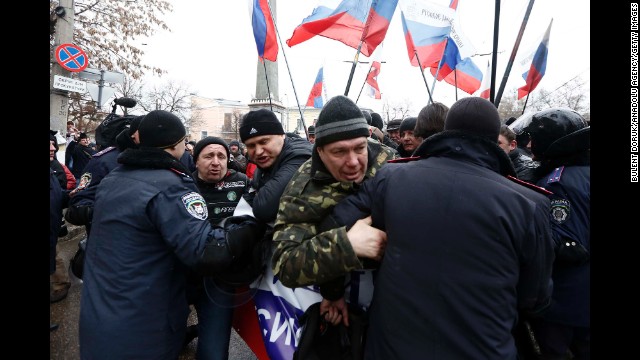 Police intervene as Russian supporters gather in front of the parliament building in Simferopol on February 27.
Police intervene as Russian supporters gather in front of the parliament building in Simferopol on February 27. 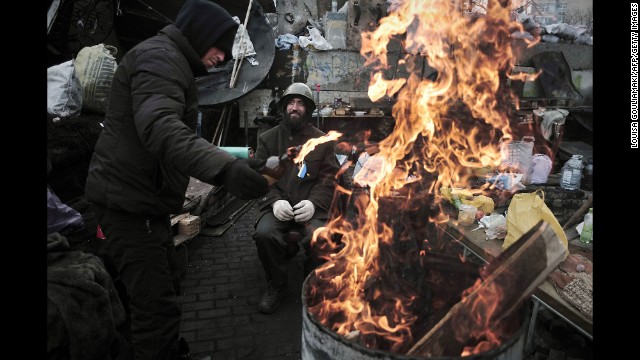 A man adds fuel to a fire at a barricade in Independence Square on February 27. Dozens of people were killed last week during clashes between security forces and protesters.
A man adds fuel to a fire at a barricade in Independence Square on February 27. Dozens of people were killed last week during clashes between security forces and protesters. 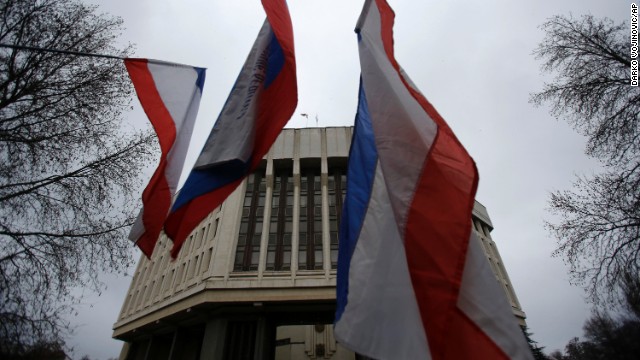 Pro-Russia demonstrators wave Russian and Crimean flags in front of a local government building in Simferopol on February 27.
Pro-Russia demonstrators wave Russian and Crimean flags in front of a local government building in Simferopol on February 27.  Barricades in front of a government building in Simferopol on February 27 hold a banner that reads: "Crimea Russia." There's a broad divide between those who support the pro-Western developments in Kiev and those who back Russia's continued influence in Crimea and across Ukraine.
Barricades in front of a government building in Simferopol on February 27 hold a banner that reads: "Crimea Russia." There's a broad divide between those who support the pro-Western developments in Kiev and those who back Russia's continued influence in Crimea and across Ukraine. 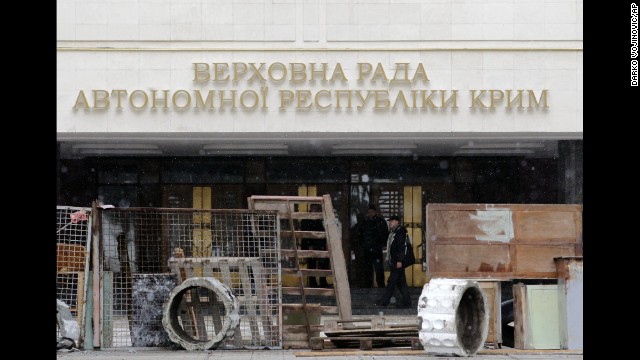 Protesters stand in front of a government building in Simferopol on February 27. Tensions have simmered in the Crimea region since the Ukrainian president's ouster.
Protesters stand in front of a government building in Simferopol on February 27. Tensions have simmered in the Crimea region since the Ukrainian president's ouster. 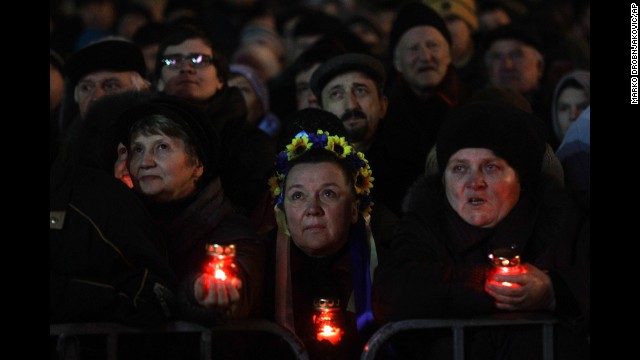 Protesters in support of the president's ouster rally in Independence Square, which has been the center of opposition, on Wednesday, February 26.
Protesters in support of the president's ouster rally in Independence Square, which has been the center of opposition, on Wednesday, February 26. 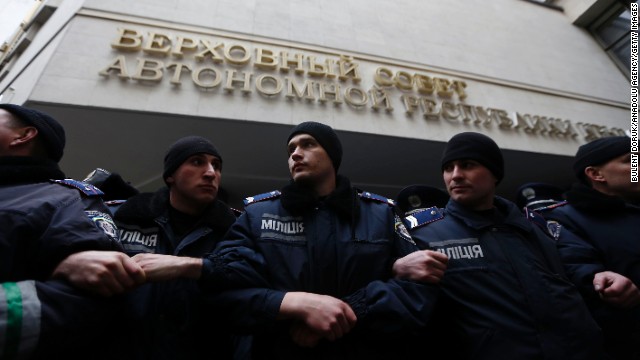 Security forces stand guard during clashes between opposing sides in front of Crimea's parliament building in Simferopol on February 26.
Security forces stand guard during clashes between opposing sides in front of Crimea's parliament building in Simferopol on February 26. 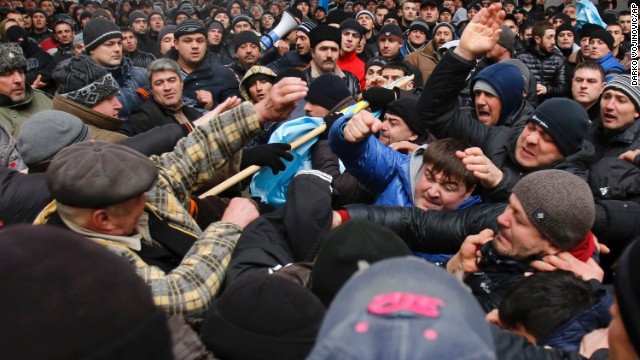 Pro-Russian demonstrators, right, clash with anti-Russian protesters in front of a government building in Simferopol on February 26.
Pro-Russian demonstrators, right, clash with anti-Russian protesters in front of a government building in Simferopol on February 26. 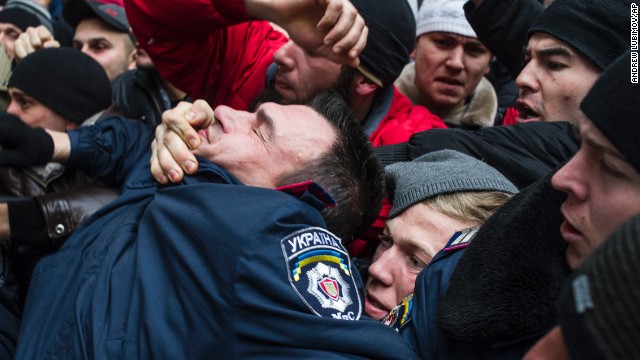 A police officer gets pulled into a crowd of Crimean Tatars in Simferopol on February 26. The Tatars, an ethnic minority group deported during the Stalin era, is rallying in support of Ukraine's interim government.
A police officer gets pulled into a crowd of Crimean Tatars in Simferopol on February 26. The Tatars, an ethnic minority group deported during the Stalin era, is rallying in support of Ukraine's interim government.  A man places flowers at a barricade near Independence Square on February 26.
A man places flowers at a barricade near Independence Square on February 26. 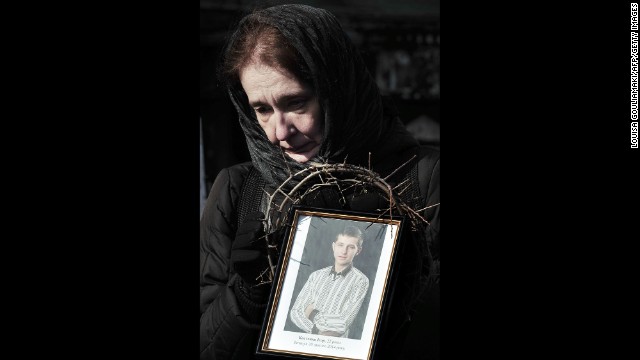 On February 26 in Kiev, A woman holds a photograph of a protester killed during the height of tensions.
On February 26 in Kiev, A woman holds a photograph of a protester killed during the height of tensions. 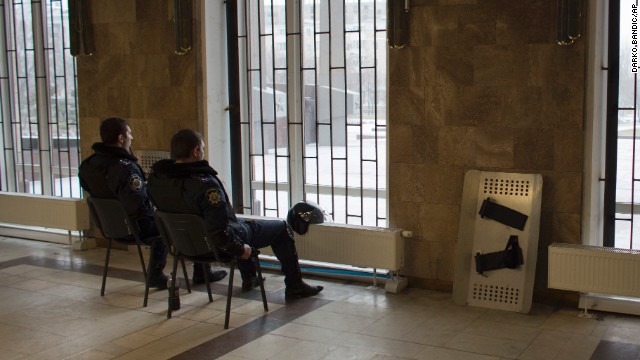 Police guard a government building in Donetsk on February 26.
Police guard a government building in Donetsk on February 26.  Protesters remove a fence that surrounds Ukraine's parliament in Kiev on February 26.
Protesters remove a fence that surrounds Ukraine's parliament in Kiev on February 26. 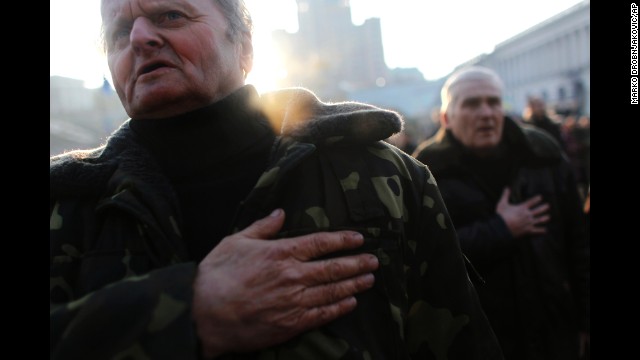 People sing the Ukrainian national anthem at Independence Square on Monday, February 24.
People sing the Ukrainian national anthem at Independence Square on Monday, February 24. 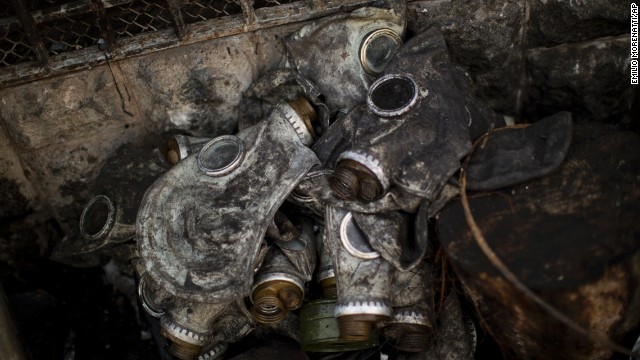 Gas masks used by protesters sit next to a barricade in Independence Square on February 24.
Gas masks used by protesters sit next to a barricade in Independence Square on February 24. 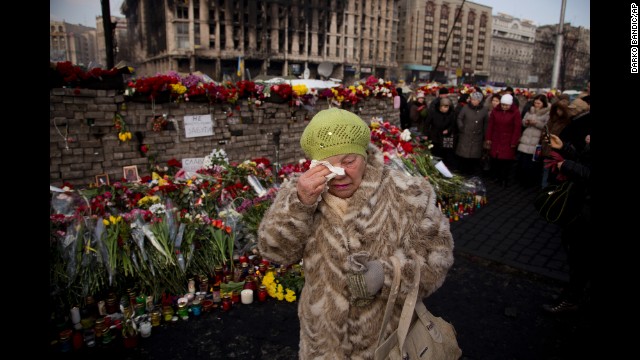 A woman cries February 24 near a memorial for the people killed in Kiev.
A woman cries February 24 near a memorial for the people killed in Kiev. 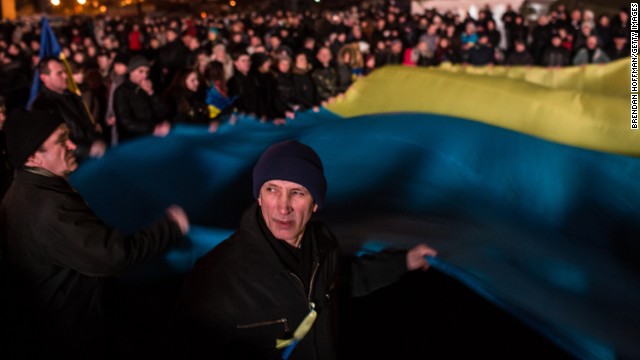 People wave a large Ukrainian flag in Independence Square on Sunday, February 23.
People wave a large Ukrainian flag in Independence Square on Sunday, February 23. 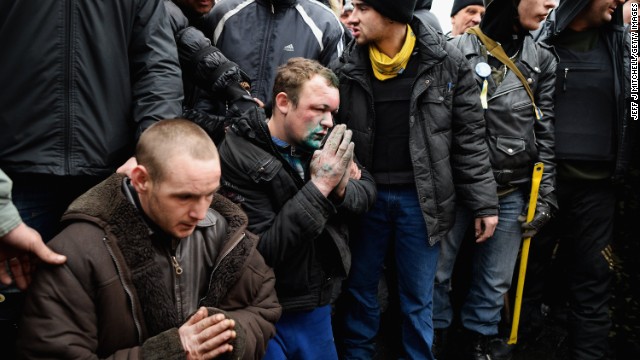 Two pro-government supporters are made to pray February 23 in front of a shrine to dead anti-government protesters.
Two pro-government supporters are made to pray February 23 in front of a shrine to dead anti-government protesters. 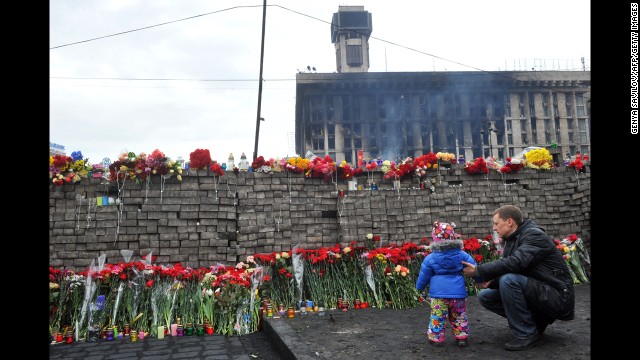 A man and his daughter lay flowers at a memorial for protesters killed in Independence Square.
A man and his daughter lay flowers at a memorial for protesters killed in Independence Square. 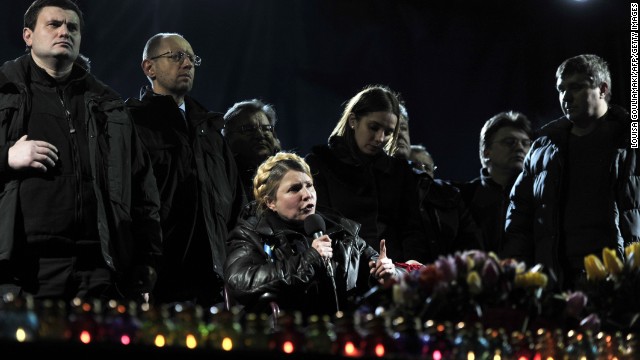 Former Prime Minister Yulia Tymoshenko speaks at Independence Square on Saturday, February 22, hours after being released from prison. Tymoshenko, considered a hero of a 2004 revolution against Yanukovych, was released after 2½ years behind bars.
Former Prime Minister Yulia Tymoshenko speaks at Independence Square on Saturday, February 22, hours after being released from prison. Tymoshenko, considered a hero of a 2004 revolution against Yanukovych, was released after 2½ years behind bars. 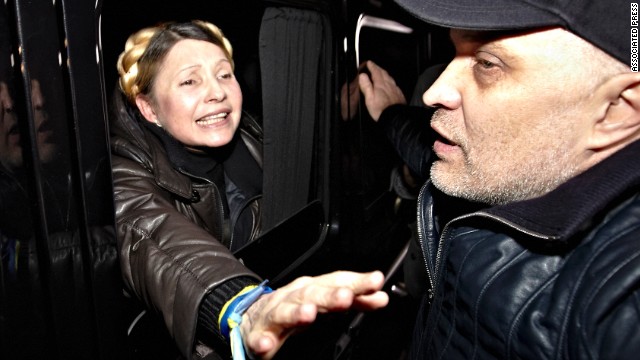 Tymoshenko is greeted by supporters shortly after being freed from prison in Kharkiv on February 22.
Tymoshenko is greeted by supporters shortly after being freed from prison in Kharkiv on February 22. 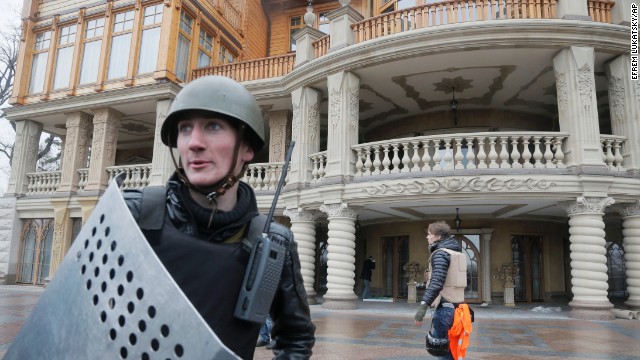 A protester guards the entrance to Yanukovych's abandoned residence outside Kiev on February 22.
A protester guards the entrance to Yanukovych's abandoned residence outside Kiev on February 22. 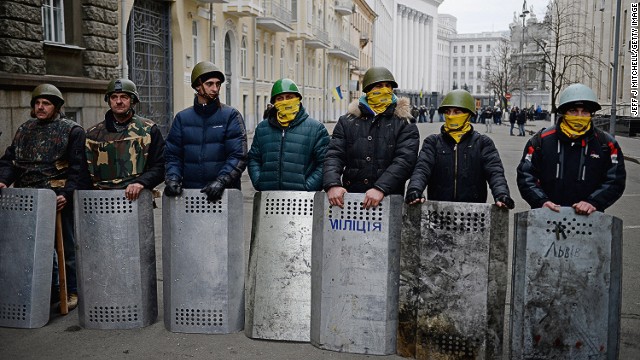 Anti-government protesters guard the streets next to the presidential offices in Kiev on February 22.
Anti-government protesters guard the streets next to the presidential offices in Kiev on February 22.  Anti-government protesters drive a military vehicle in Independence Square on February 22. Many protesters said they wouldn't leave the square until Yanukovych resigned.
Anti-government protesters drive a military vehicle in Independence Square on February 22. Many protesters said they wouldn't leave the square until Yanukovych resigned. 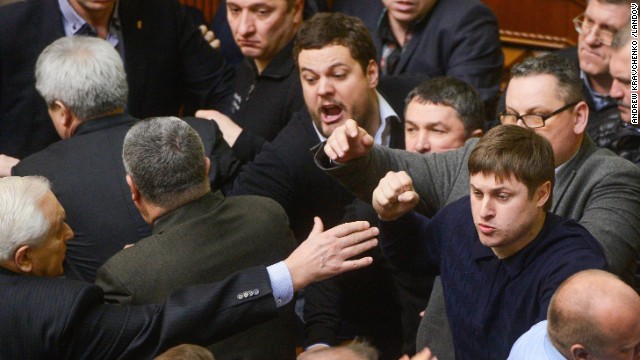 Ukrainian lawmakers argue during a session of Parliament on Friday, February 21.
Ukrainian lawmakers argue during a session of Parliament on Friday, February 21. 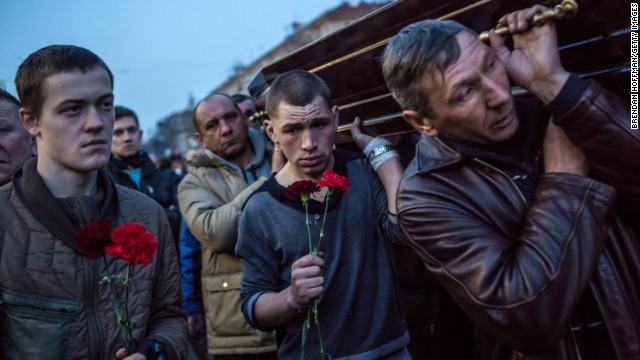 Men in Kiev carry a casket containing the body of a protester killed in clashes with police.
Men in Kiev carry a casket containing the body of a protester killed in clashes with police. 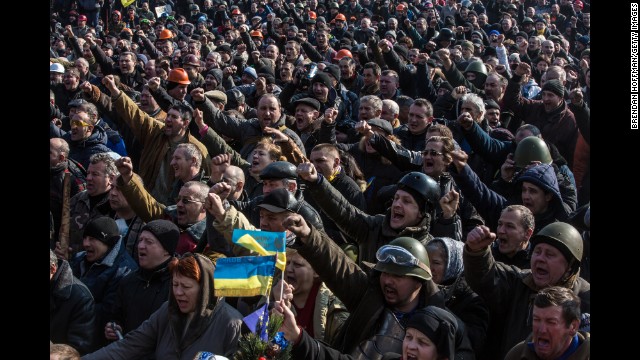 Protesters cheer after news of an agreement between the opposing sides in Kiev on February 21.
Protesters cheer after news of an agreement between the opposing sides in Kiev on February 21.  Photos: Crisis in Ukraine
Photos: Crisis in Ukraine 
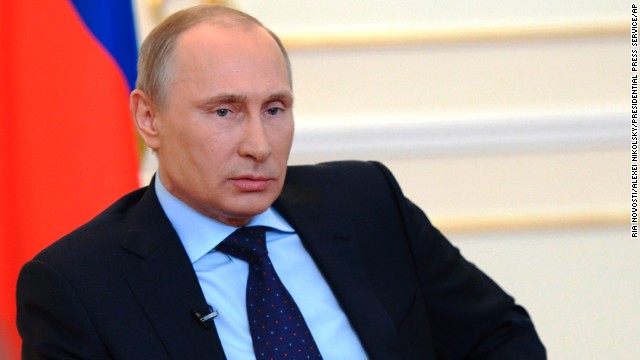 Russian President Vladimir Putin: Russian forces are in a tense standoff with Ukrainian forces in Crimea, an autonomous region of eastern Ukraine with strong loyalty to neighboring Russia. Putin has denied that Russian troops are in Crimea, but he told U.S. President Barack Obama that Russia's Parliament approved military action in Ukraine because it "reserves the right to defend its interests and the Russian-speaking people who live there."
Russian President Vladimir Putin: Russian forces are in a tense standoff with Ukrainian forces in Crimea, an autonomous region of eastern Ukraine with strong loyalty to neighboring Russia. Putin has denied that Russian troops are in Crimea, but he told U.S. President Barack Obama that Russia's Parliament approved military action in Ukraine because it "reserves the right to defend its interests and the Russian-speaking people who live there." 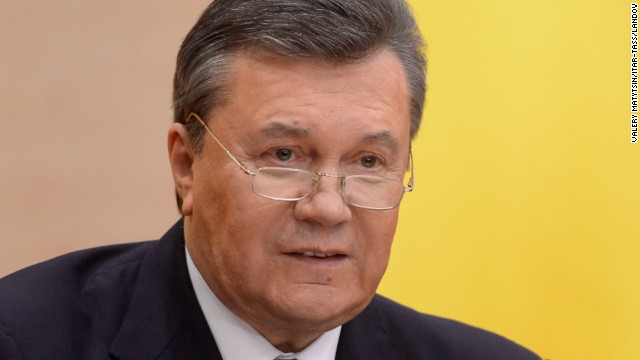 Former Ukrainian President Viktor Yanukovych: Ukraine has been in chaos since February, when Yanukovych was ousted after anti-government protests turned deadly in the capital of Kiev. The demonstrations started in late November, when Yanukovych spurned a deal with the European Union, favoring closer ties with Russia instead. The Ukraine Parliament voted Yanukovych out of power on February 22, and he fled to Russia. But in a recent news conference, the former President insisted he was still the boss and that he wants nothing more than to lead his country to peace, harmony and prosperity.
Former Ukrainian President Viktor Yanukovych: Ukraine has been in chaos since February, when Yanukovych was ousted after anti-government protests turned deadly in the capital of Kiev. The demonstrations started in late November, when Yanukovych spurned a deal with the European Union, favoring closer ties with Russia instead. The Ukraine Parliament voted Yanukovych out of power on February 22, and he fled to Russia. But in a recent news conference, the former President insisted he was still the boss and that he wants nothing more than to lead his country to peace, harmony and prosperity.  Ukrainian Prime Minister Arseniy Yatsenyuk: Ukraine's interim prime minister has urged Russia to pull back its military, warning that the two countries were "on the brink of disaster." The comments came as a convoy of Russian troops rolled toward Simferopol, the capital of Crimea, a day after they took over the strategic Black Sea peninsula without firing a shot. "There are no grounds for the use of force against civilians and Ukrainians, and for the entry of the Russian military contingent," Yatsenyuk said. "Russia never had any grounds and never will."
Ukrainian Prime Minister Arseniy Yatsenyuk: Ukraine's interim prime minister has urged Russia to pull back its military, warning that the two countries were "on the brink of disaster." The comments came as a convoy of Russian troops rolled toward Simferopol, the capital of Crimea, a day after they took over the strategic Black Sea peninsula without firing a shot. "There are no grounds for the use of force against civilians and Ukrainians, and for the entry of the Russian military contingent," Yatsenyuk said. "Russia never had any grounds and never will."  U.S. President Barack Obama: Obama has said any violation of Ukraine's sovereignty and territorial integrity would be "deeply destabilizing," and he warned "the United States will stand with the international community in affirming that there will be costs for any military intervention in Ukraine."
U.S. President Barack Obama: Obama has said any violation of Ukraine's sovereignty and territorial integrity would be "deeply destabilizing," and he warned "the United States will stand with the international community in affirming that there will be costs for any military intervention in Ukraine."  Crimean Prime Minister Sergey Aksyonov: Aksyonov was installed as the prime minister of Crimea after armed men took over the Crimean Parliament building in late February. The pro-Russian leader asked Putin for help in maintaining peace on the Black Sea peninsula where Russia's fleet is based. Security forces "are unable to efficiently control the situation in the republic," he said in comments broadcast on Russian state channel Russia 24.
Crimean Prime Minister Sergey Aksyonov: Aksyonov was installed as the prime minister of Crimea after armed men took over the Crimean Parliament building in late February. The pro-Russian leader asked Putin for help in maintaining peace on the Black Sea peninsula where Russia's fleet is based. Security forces "are unable to efficiently control the situation in the republic," he said in comments broadcast on Russian state channel Russia 24.  Russian Foreign Minister Sergei Lavrov: At a U.N. human rights meeting in Geneva, Switzerland, Lavrov brushed aside claims that Russia's troop movements were an act of aggression. "I repeat: This is a matter of defending our citizens and our compatriots, of defending the most important human right -- the right to life," he said.
Russian Foreign Minister Sergei Lavrov: At a U.N. human rights meeting in Geneva, Switzerland, Lavrov brushed aside claims that Russia's troop movements were an act of aggression. "I repeat: This is a matter of defending our citizens and our compatriots, of defending the most important human right -- the right to life," he said. 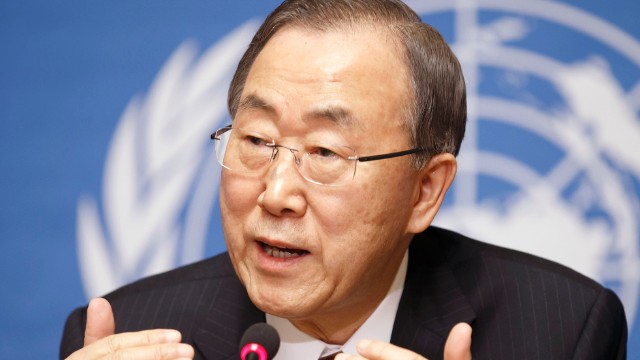 U.N. Secretary-General Ban Ki-moon: Ban dispatched a special envoy to Ukraine on Sunday, March 2, a spokesman for his office said. The United Nations has warned Russia against military action, while Ban told Putin "dialogue must be the only tool in ending the crisis."
U.N. Secretary-General Ban Ki-moon: Ban dispatched a special envoy to Ukraine on Sunday, March 2, a spokesman for his office said. The United Nations has warned Russia against military action, while Ban told Putin "dialogue must be the only tool in ending the crisis."  U.S. Secretary of State John Kerry: America's top diplomat has condemned what he called Russia's "incredible act of aggression." Speaking on the CBS program "Face The Nation," Kerry said several foreign powers are looking at economic sanctions against Russia if Russia does not withdraw its forces.
U.S. Secretary of State John Kerry: America's top diplomat has condemned what he called Russia's "incredible act of aggression." Speaking on the CBS program "Face The Nation," Kerry said several foreign powers are looking at economic sanctions against Russia if Russia does not withdraw its forces. 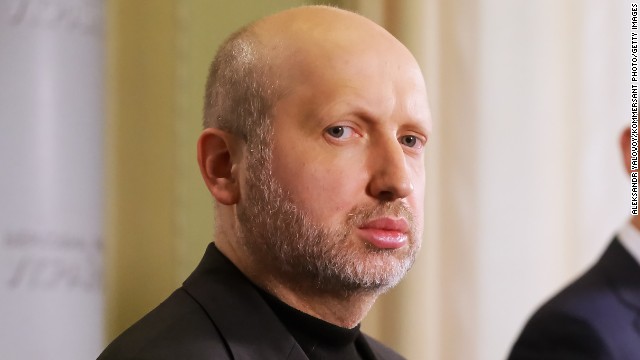 Ukrainian President Olexander Turchynov: Turchynov became acting president of Ukraine after Yanukovych's ouster. Like Prime Minister Arseniy Yatsenyuk, he has warned that any Russian military intervention would lead to war.
Ukrainian President Olexander Turchynov: Turchynov became acting president of Ukraine after Yanukovych's ouster. Like Prime Minister Arseniy Yatsenyuk, he has warned that any Russian military intervention would lead to war.  Ukrainian opposition leader Vitali Klitschko: The former heavyweight boxing champion -- and brother of current champion Wladimir -- is probably the most well-known figure representing the Ukrainian opposition to Yanukovych. He heads the Ukrainian Democratic Alliance for Reforms party, but the opposition bloc goes well beyond Klitschko and that party.
Ukrainian opposition leader Vitali Klitschko: The former heavyweight boxing champion -- and brother of current champion Wladimir -- is probably the most well-known figure representing the Ukrainian opposition to Yanukovych. He heads the Ukrainian Democratic Alliance for Reforms party, but the opposition bloc goes well beyond Klitschko and that party.  Former Ukrainian Prime Minister Yulia Tymoshenko: Tymoshenko, considered a hero of a 2004 revolution against Yanukovych, was released in late February after 2½ years behind bars. In an exclusive interview with CNN, Tymoshenko called on the world to help Ukraine: "If Ukraine is left on its own and is given to Russia, then the world will change. Not only politics and life in Ukraine will change -- the politics and life will change practically everywhere in the world."
Former Ukrainian Prime Minister Yulia Tymoshenko: Tymoshenko, considered a hero of a 2004 revolution against Yanukovych, was released in late February after 2½ years behind bars. In an exclusive interview with CNN, Tymoshenko called on the world to help Ukraine: "If Ukraine is left on its own and is given to Russia, then the world will change. Not only politics and life in Ukraine will change -- the politics and life will change practically everywhere in the world."  Russian Prime Minister Dmitry Medvedev: In a post on his official Facebook page, Medvedev called Yanukovych's ouster a "seizure of power." "Such a state of order will be extremely unstable," Medvedev said. "It will end with the new revolution. With new blood."
Russian Prime Minister Dmitry Medvedev: In a post on his official Facebook page, Medvedev called Yanukovych's ouster a "seizure of power." "Such a state of order will be extremely unstable," Medvedev said. "It will end with the new revolution. With new blood."  German Chancellor Angela Merkel: Merkel's office said Putin had accepted a proposal to start a political dialogue and establish a "fact-finding mission" to Ukraine, possibly under the leadership of the Organization for Security and Co-operation in Europe.
German Chancellor Angela Merkel: Merkel's office said Putin had accepted a proposal to start a political dialogue and establish a "fact-finding mission" to Ukraine, possibly under the leadership of the Organization for Security and Co-operation in Europe.  British Prime Minister David Cameron: Cameron posted on his verified Twitter account that he and Obama were in agreement that "Russia's actions are unacceptable and there must be significant costs if they don't change course."
British Prime Minister David Cameron: Cameron posted on his verified Twitter account that he and Obama were in agreement that "Russia's actions are unacceptable and there must be significant costs if they don't change course." Crisis in Ukraine: Key players
Crisis in Ukraine: Key players
Crisis in Ukraine: Key players
Crisis in Ukraine: Key players
Crisis in Ukraine: Key players
Crisis in Ukraine: Key players
Crisis in Ukraine: Key players
Crisis in Ukraine: Key players
Crisis in Ukraine: Key players
Crisis in Ukraine: Key players
Crisis in Ukraine: Key players
Crisis in Ukraine: Key players
Crisis in Ukraine: Key players
Crisis in Ukraine: Key players
 Crisis in Ukraine: Key players
Crisis in Ukraine: Key players  Ukrainian crisis: 'This is Putin's show'
Ukrainian crisis: 'This is Putin's show' In backing away from this face-saving compromise, one that was negotiated with the approval of the French, German and Polish governments, and which surely would have resulted in the removal of Yanukovych, moderate opposition leaders essentially capitulated to the far right.
The Russian position is also somewhat bolstered by the fact that Svoboda holds key posts in the interim government in Kiev, including that of deputy prime minister. Andriy Parubiy, the commander of the "Maidan self-defense," has been appointed the head of the National Security and Defense Council, and the leader of the Right Sector ultras, Dmitro Yarosh, is expected to become his deputy chairman. Svoboda controls the prosecutor general office and the ministries of ecology and agriculture.
At very least, the interim government has made bedfellows of some highly suspect and divisive forces.
But it is also true to say that many of the specific details of far-right activity and influence are anecdotal and perhaps contradictory.
On the one hand, there are reports of Jewish homes in Lviv and the western part of Ukraine being daubed with anti-Semitic slogans; on the other, Ukraine's head rabbi has weighed in with the opinion that anti-Semitism is "not on the rise." A group of Jewish groups sent an open letter to Putin that said, in part, "Your certainty of the growth of anti-Semitism in Ukraine also does not correspond to the actual facts."
It is also true that far-right forces are on the rise across Europe, including in the "respectable" democracies of the West, and that their targets range from Jews to Roma to gays to any "out" group, including the miscellany of new immigrants who are encouraged under European Union laws of free movement.
Finally, it is true that the long reach of memory evokes images from 70 years ago, those of robust support in western Ukraine for the fascist side during World War II. This is especially true in the east and south of a divided country, those regions that look to Moscow rather than to Washington or Brussels.
But these various points do not alter the fact that the European Parliament undertook the extraordinary measure of singling out Ukrainian ultra-nationalism, nor do they gainsay the role of its most influential exponent, Svoboda, in the new interim government.
In this context, and even as they may disagree on specific measures to be taken the path toward a prosperous, peaceful, united, democratic Ukraine, sober observers agree that this can be achieved only with the marginalization of the far right.
Unfortunately, the appointments of ultra-rightists to the interim government place this in serious question. Looking ahead, we must hope that the meeting in Brussels of the European foreign ministers, including Russia -- the first, we assume, of several -- may create a blueprint for Ukraine based on cooperative solutions rather than confrontation.
Follow us on Twitter @CNNOpinion .
Join us on Facebook/CNNOpinion .
The opinions expressed in this commentary are solely those of David Speedie.
No comments:
Post a Comment